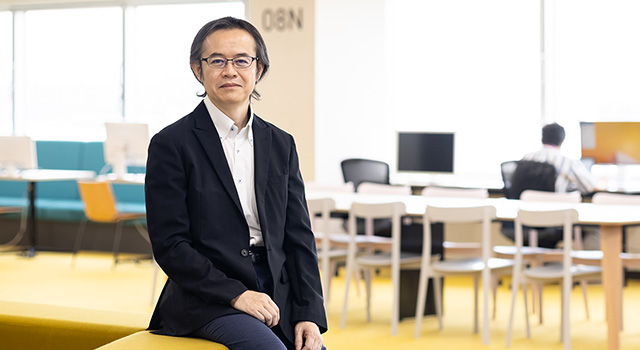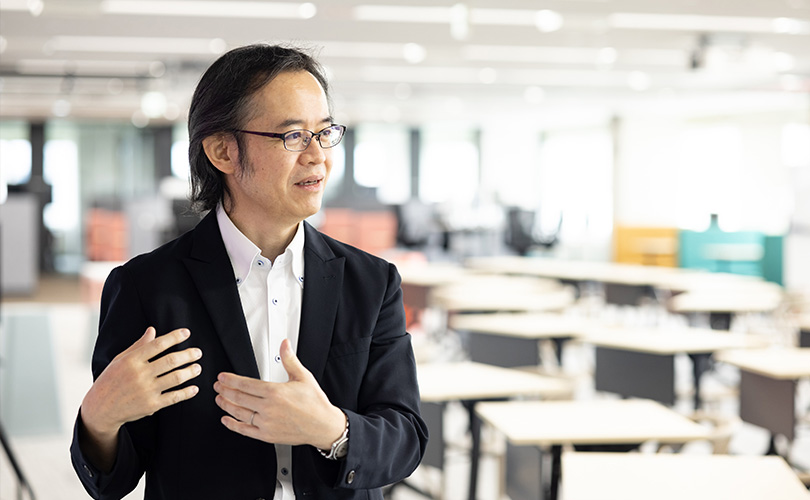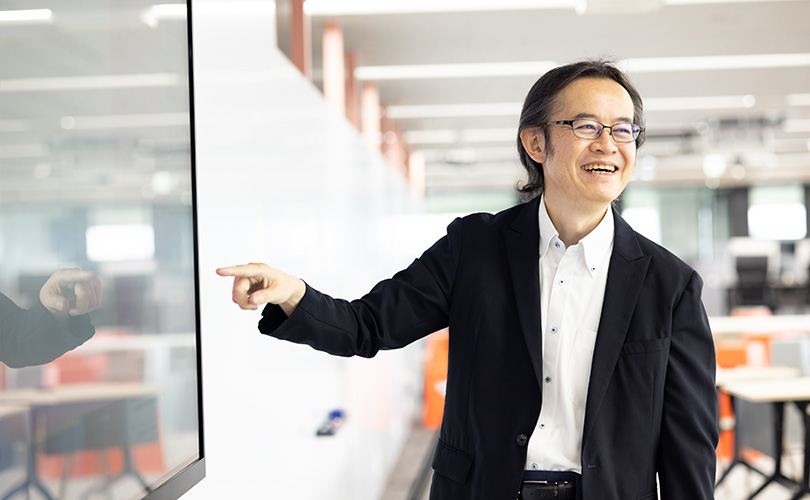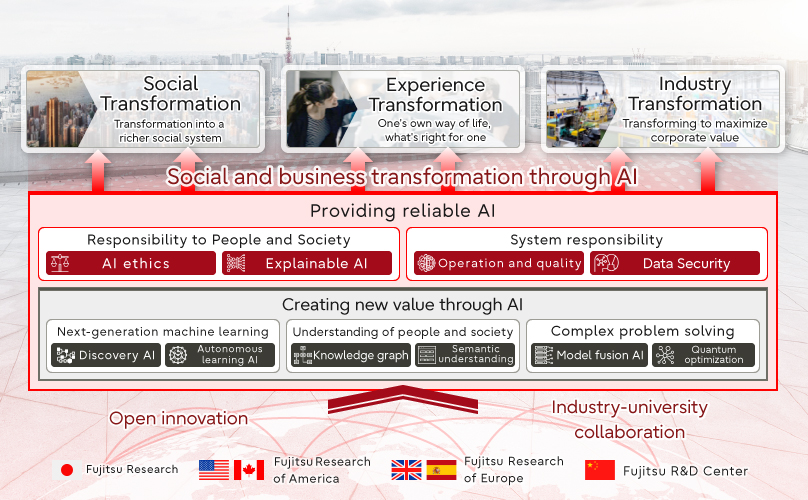Artificial Intelligence
Trusted AI – Working With People to Create New Value
Hirokazu Anai
Head of Artificial Intelligence Laboratory Research Unit Fujitsu Limited



AI Black Box Issues Surrounding Reliability
Until relatively recently, many people had not heard about AI (artificial intelligence). But today the technology has spread so rapidly that it has become an integral and essential part of our lives, involving large amounts of data and supporting human decision making. Currently, AI is primarily used to determine and predict things, but in the future, it is likely to be able to support more advanced decision making, such as discovering and suggesting the most appropriate next actions to humans.
Getting to this point does, however, rely on some important issues to be solved. The principal one surrounds AI’s reliability. AI today uses vast amounts of data to make decisions, but it's not good at providing evidence to support why. For example, how can you trust AI if you can't explain why it made a specific decision in a bank credit review? This is what is known as the “black box” problem involving AI. If we are to use AI confidently in various aspects of society in the future, we have to get rid of the black box element and enhance AI’s accountability. There are also ethical issues to factor in, involving any bias in the data being learned and subsequently prejudicing the answers presented by AI.
In addition, there is the AI quality issue. The AI learns the data, generating a decision and identification model. But if the distribution of the data used in the field is different to that used at the time of learning, the AI understandably cannot make a correct decision. This can lead to the accuracy of AI deteriorating between the time of learning to when AI is operated. An example involves credit risk assessments of financial institutions. If economic conditions change significantly after the learning process, or if there are subsequent changes in exchange rates, prices, or regulations, the credit assessment model becomes obsolete.

Two New Perspectives to Harness the Potential of AI
Fujitsu's Artificial Intelligence Laboratory is tackling these challenges head on, pursuing research on two key fronts. The first involves research and development to provide "Trusted AI" by eliminating risks and barriers when AI is implemented in society. The second is research and development on "AI that creates new value", with the aim of achieving social and business transformation through AI.
"Trusted AI"
"Trusted AI" revolves around solving the black box problem and realizing AI that can genuinely cooperate with humans. Specifically, there are three main types involved: "explainable AI" "AI Quality" and "AI ethics".
In explainable AI, we are conducting research and development on AI technology to explain the reasons behind the judgment results presented by AI. Specifically, we are developing two machine learning technologies: "Deep Tensor" that learns connections between people and objects (graph structure), and "Wide Learning" that comprehensively learns a huge combination of data items and presents hypotheses. By combining this with "Knowledge Graph", which is a database with a graph structure of knowledge drawn from a huge amount of literature and papers, we are working to realize an explainable AI that not only shows how AI made a judgment, but also verifies its validity using human knowledge as the basis.
As for the quality of AI, we are currently developing "High Durability Learning (HDL)". This is the world's first technology capable of detecting changes in the shape of data groups used by AI, monitoring and automatically restoring accuracy without needing to use correct data. This minimizes the loss of accuracy due to changes in data distribution and significantly reduces the cost and effort of AI relearning.
Regarding AI ethics, we have recently established the AI Ethics Research Center and are actively involved in the formulation of rules and guidelines through activities in various consortia and policy advocacy groups. We are also working to create new technologies and approaches to AI ethics through global interdisciplinary research with collaboration partners.
"AI That Creates New Value"
One of our principal objectives is to take AI to new levels and create new value for society. This activity involves three key components in our research and development of leading-edge technologies - "AI for discovery", "autonomous learning AI" and "Model fusion AI".
The AI for discovery element is not only the AI that explains the reason, but also the AI that discovers the cause and effect. Today, it's common for humans to analyze information presented by AI to determine new facts and discoveries. In the future, these discoveries will also be supported by AI.
Autonomous learning AI is an advanced research theme for realizing AI that learns and grows through various experiences in the same way as humans do. Rather than learning the superficial relationships between large amounts of data as with AI today, our aim is to develop an AI that can gradually understand the social mechanisms that generate data and respond to situations that we have never experienced before, with the need for any human assistance.
Model fusion AI is an AI that supports decision-making for appropriate measures to solve social problems. It does this by simulating complex phenomena from real world models generated in digital space, and analyzing various scenarios that appear in the simulation. It also uses the world's most powerful supercomputer "Fugaku" (Note 1).
Note: The supercomputer "Fugaku" is a joint development by RIKEN and Fujitsu Limited, and came into service in March 2021. It holds the top spot in the world's supercomputers rankings: (1) "Top 500", (2) "HPCG (High Performance Conjugate Gradient)", (3) "HPL-AI", and (4) "Graph 500".

Solving Medical and Social Problems With AI
The latest AI technologies are already proving highly successful in many areas, including medicine and society.
Genomic medicine is one example of a medical field in which we are focusing considerable attention. Our work in genomic medicine is concentrating on AI that can be both explained discovered. Not only can genetic data be used to determine which genomic mutations lead to which cancers, but knowledge graphs can be combined and linked to the latest research to explain the medical evidence. In fact, in a demonstration experiment conducted with the Institute of Medical Science of the University of Tokyo, this method has proved it can halve the number of times doctors are required to review treatment policies for acute myeloid leukemia.
One example of AI that can help solve social issues involves using Fugaku and AI for tsunami disaster countermeasures. A large number of simulations are conducted in Fugaku in advance, and given to the AI to learn. As a result, even a general-purpose PC can predict flooding with 3-meter resolution in just a few seconds when a disaster actually occurs. For various cases of tsunami, we can decide the best evacuation action through evacuation simulation scenarios.
AI in society - working with people
Based on the fundamental belief that technology is closely related to people, Fujitsu's Artificial Intelligence Laboratory is conducting research and development on AI for widespread use in society. The Institute is promoting global initiatives in an integrated manner, with some 170 researchers with diverse backgrounds working from offices in Japan, the United States, China, and Europe. We are also actively collaborating with top research institutions in Japan and overseas. For example, we are conducting research on topological data analysis (TDA), which can identify factors contributing to the detection of abnormalities using time-series AI, in collaboration with the French National Institute of Automation in Informatics (INRIA). By applying this to electrocardiogram data, we believe that this technology can enable early detection of cardiac dysfunction. Another application involves infrastructure detection, for the inspection and repair of aging bridges. By estimating damage at the earliest possible stage, inspection and repairs can be initiated, reducing the overhead of bridge maintenance and management.
There's no doubt that AI technology will increasingly be applied to all industries and used across many aspects of society. Healthcare will become more individually-optimized, and many of the more people-dependent services of government will be automated. Automation will change the way people work and live, with people able to focus on more creative tasks.
Fujitsu's Artificial Intelligence Laboratory is conducting research and development on AI with the aim of creating a harmonious society where people can lead comfortable and profitable lives, confident that risks such as natural disasters and health are minimized.
 Fujitsu's AI research
Fujitsu's AI research



